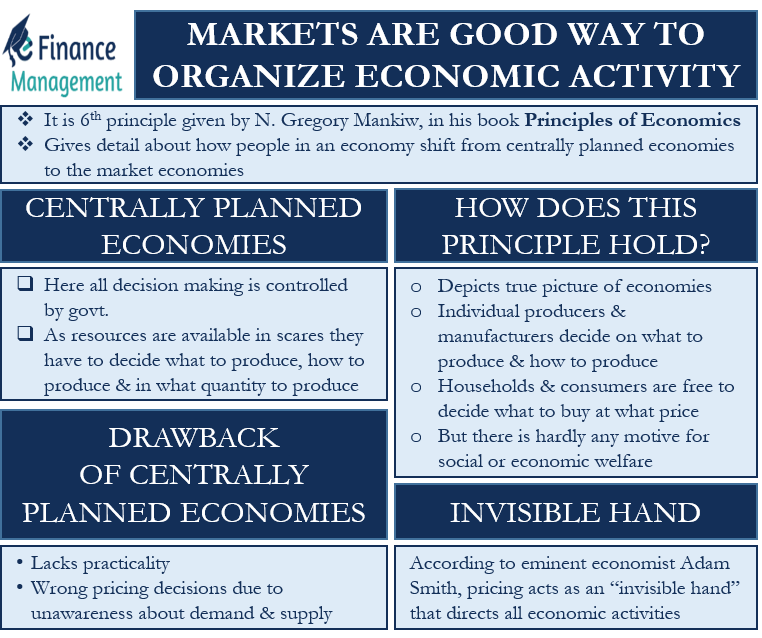Markets are Usually a Good Way to Organize Economic Activity
“Markets are usually a good way to organize economic activity” is the sixth principle out of the ten principles of economics given by the famous economist N. Gregory Mankiw, in his book “Principles of Economics,” This principle explains how people interact with each other in an economy. It gives us a detailed overview of how people in an economy shift from centrally planned economies to market economies.
What is a Centrally Planned Economy?
Economies with central planning work on the premise that the heads of the government, along with the government officials, can allocate scarce economic resources in an economy in the best possible manner. All the decision-making is centralized. They decide what and how much to produce, who will produce, how much the people will consume, and the prices to sell the goods and services in the economy. The general consumers and the producers have very limited decision-making power.
Shortcomings of Centrally Planned Economies
The central idea behind such a system is the promotion of the overall economic well-being of the economy. It is a belief that the government will work for the welfare of the people rather than just profits. However, this system lacks practicality. Centralized price control disrupts the free motion of the economy. Also, planners are unaware of the actual demand and supply side factors that affect the prices in an economy. This results in wrong pricing decisions and exploitation of the market participants.
How does “Markets are Usually a Good Way to Organize Economic Activity” Hold?
“Principle 6: Markets are usually a good way to organize economic activity” depicts the true picture of economies in the present era of globalization. We are now on the path to becoming “market economies.” The decision-making process of what and how much to produce is not in government control anymore. The individual producers and manufacturers decide it. Also, households and consumers are free to decide what to buy and at what price. The demand-side and supply-side factors interact with each other and help us to arrive at the equilibrium price. However, it is true that self-interest decides these prices. There is hardly any motive for social and economic welfare.

The Invisible Hand
According to eminent economist Adam Smith, pricing acts as an “invisible hand” that directs all economic activities. The households interact with the producers. Accordingly, they reach the desired market outcomes.
The suppliers in the economy decide on how much to supply at a given price. Similarly, the buyers also decide on how much to buy at a given price. The two forces of demand and supply help us to arrive at the equilibrium point. This equilibrium point is the point where the demand in the economy is equal to the supply. It reflects the value that the buyers put on that product and the cost to society to make that product. In most cases, arriving at the equilibrium point results in the well-being and welfare of society.
It is in the best interest of the markets to leave them to make their own decisions. The market economy helps to create a free society. There is no doubt that “self-interest” guides the market participants. A manufacturer will not make a product out of love for others but for his self-interest. Similarly, service providers like a dry-cleaner or a taxi service will also not work for charity but for personal gains. However, even though the participants in the market are influenced by self-interest, the “invisible hand” of the marketplace acts as a guiding force. Eventually, it promotes general economic well-being.
Summary
Big countries like the Soviet Union and Eastern Europe have seen the exit of communism. Most countries now know that economies with central planning are not the way forward. The face of world trade is no longer the same due to globalization. If the government in any country interferes in the pricing of general items of trade, the country cannot withstand international competition. It will be thrown out of world trade.
Hence, a “market economy” is the way to go ahead. The “invisible hand” of pricing will automatically take over. It will help the market participants to arrive at an equilibrium. Also, self-interest will pave the way for the overall well-being and welfare of the market and its participants.

